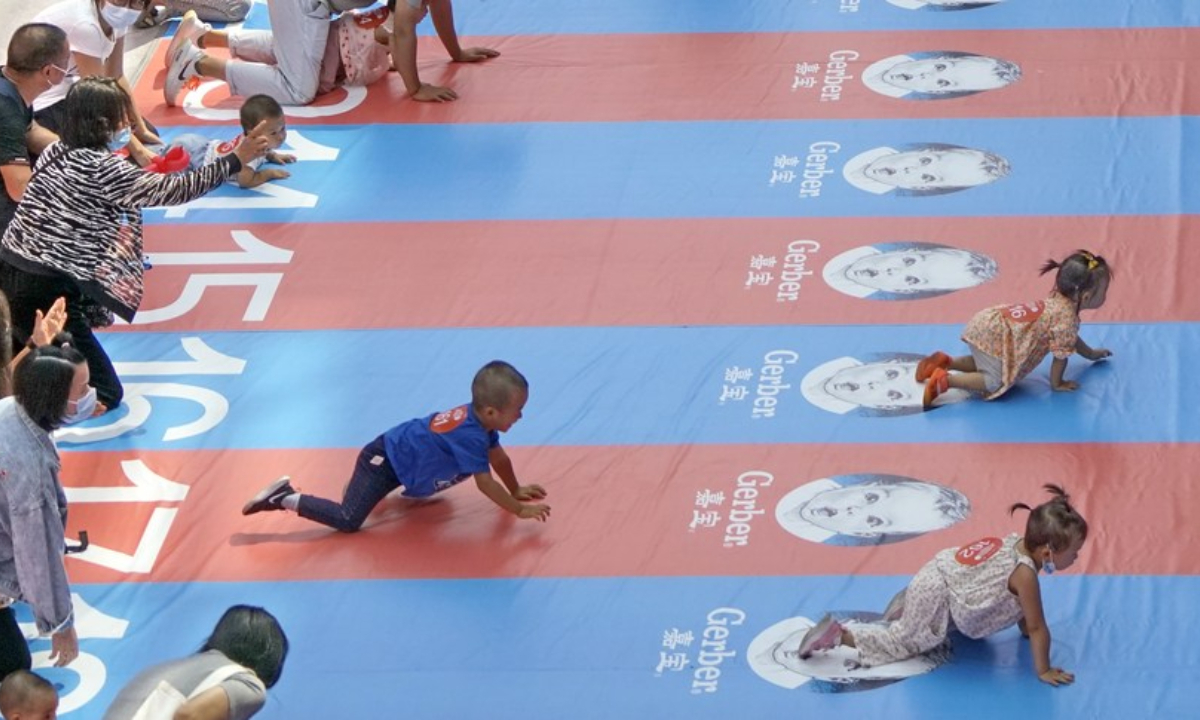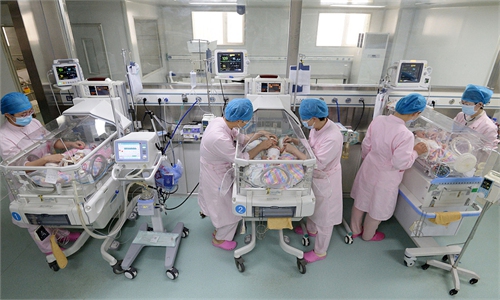Professor's idea of granting one-bedroom house to young parents upon child birth sparks debate

Babies participate in a baby crawling contest at a shopping center in Daxing District, Beijing, capital of China, Sep 13, 2020. Photo:Xinhua
Tilting social welfare policies in favor of young people to encourage new births in the face of a low birth rate has been a common view in Chinese society. However, the idea of offering a house as a gift to young parents upon the birth of a child, proposed by a Chinese professor, hasn't received as much support. The suggestion has ignited a firestorm of online discussions and debates.
Professor Di Dongsheng from the Renmin University of China put forward the proposal in a recent episode of the program "China Is Speaking" aired on Southeast Television, in 2023.
He began by noting that young women giving birth to children is a valuable contribution to labor and has profound significance for the country and society. He then expressed his belief that the state should provide corresponding subsidies to these young women to recognize their contributions to society.
Di further proposed that such subsidies can be diversified, and one direct way is to provide housing subsidies for young women, adding that the house needn't be big, but rather a modest single-bedroom house to accommodate a one-child family.
"What if I said yes, would you gift one one-bedroom house to me?" Chenchen, a netizen posted, throwing the question back to the professor, questioning the practicality of the scheme.
Others opined that such a policy would not move them into parenthood. "It is true that I am tempted, but if marriage protection and psychological care for women are not enough, I still refuse to give birth," Jiuer wrote. "It seems like one house is a once-and-for-all solution for those who don't want a child… [it is useless] unless you sent the money for the milk powder, too," Weile, another netizen commented.
But "some families may force the mother to have one child after another in order to get more houses. Eventually, it may lead to female reproductive exploitation," Liubao, another commenter argued. "It really depends on the city in which the house is located. Presenting me with a house in the middle of nowhere wouldn't prompt me to move in," Lingling said.
One online poll, in which over 225,000 people participated, revealed an overwhelming support for the professor's idea among netizens. Out of the total respondents, 141,000 expressed their desire to have a child if they were offered a one-bedroom house as a gift, while the remaining 83,000 opted to not have children .
Demographers reached by the Global Times generally pointed out the fanciful nature of Di's remarks, noting that housing is just one of the factors contributing to young people's reluctance to have children. Boosting people's desire to have children requires a comprehensive strategy on how to build a "birth-friendly society."
A Tianjin-based demographer who spoke on condition of anonymity described Di's remarks as short-sighted and poorly thought out.
Clearly, purely relying on material rewards cannot solve the problem, Peng Xizhe, director of the Fudan University Center for Population and Development Policy Studies, said.
The government's preferential policies should not be aimed at reversing people's attitudes toward childbearing or persuading them to have children. Instead, preferential policies should aim to provide as much support and welfare as possible to those who are willing to have children, Peng told the Global Times.
Some of the supporting measures reported by the media include granting parental leave, childcare allowances, and flexible work arrangements on a family basis, in order to increase paternal involvement in childcare, reduce employment discrimination against women due to childbirth, and alleviate women's concerns about having children.
Linze County in Gansu, for instance, issued a document to provide annual childcare subsidies worth 5,000 yuan for every second child and 10,000 yuan for every third child until the child is 3 years old.
To actively respond to the population worries and effectively address the dilemma of declining birth rates, Li Ting, a professor at the School of Sociology and Population Studies at the Renmin University of China, suggests an overall practical plan for a "birth-friendly society," establish a long-term, comprehensive, and strategic reproductive support childbirth system.
Peng noted that the most crucial issue is still finding a balance between women's career development and their family responsibilities. This requires not only comprehensive government policies but also the cultivation of a culture that supports childbearing, as well as greater tolerance and support for women from the society as a whole, Peng said.
Developed countries, including Singapore, Japan, and South Korea, have comprehensive policies to encourage childbirth, but their birth rates have not increased significantly. It is more about a change in people's lifestyles and their overall concept, Peng said.
The total number of births nationally was 9.56 million in 2022. Among the births in 2022, second children accounted for 38.9 percent of the total, while the proportion of third children and above accounted for 15.0 percent, according to the National Health Commission.



